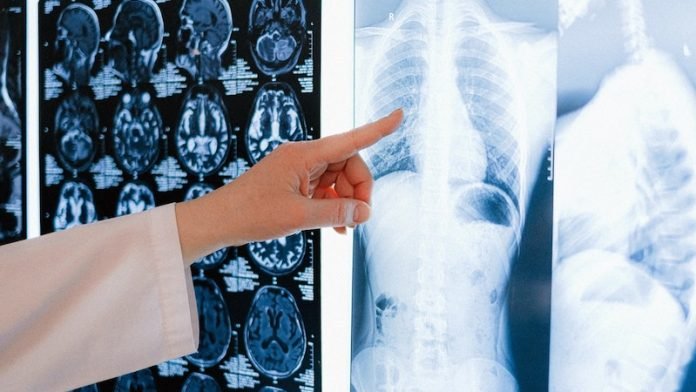
A new study from Innsbruck Medical University found some people recovering from COVID-19 pneumonia have CT evidence of damage to their lungs that persists a full year after the onset of symptoms.
The study is published in Radiology and was conducted by Anna Luger et al.
COVID-19’s short-term effects on the lungs, such as pneumonia, are well documented. Much less is known about the illness’ long-term effects on the lungs.
In the study, researchers looked at patterns and rates of improvement of chest CT abnormalities in patients one year after COVID-19 pneumonia.
CT has been an important imaging tool in the workup of patients suspected of having COVID-19.
The researchers assessed lung abnormalities on chest CT in 91 participants, mean age 59 years, at several points over one year after the onset of COVID-19 symptoms.
At one year, CT abnormalities were present in 49, or 54%, of the 91 participants.
Of these 49 participants, two (4%) had received outpatient treatment only, while 25 (51%) were treated on a general hospital ward and 22 (45%) had received intensive care unit (ICU) treatment.
While CT abnormalities decreased in initial follow-ups, 63% of participants with abnormalities did not show any further improvement after six months.
The team found age over 60 years, critical COVID-19 severity and male gender were associated with persistent CT abnormalities at one year.
Evidence from the SARS-CoV-1 outbreak of 2002 to 2004 shows that lung abnormalities may remain detectable even after decades, but do not show any progression.
The study underscores radiology’s role in helping identify patients at risk for post-COVID-19 consequences and assisting in COVID-19 follow-up management.
The researchers intend to continue gathering data on patients with persistent CT abnormalities.
Sign up for our newsletter for more information about this topic.
Previous research has reported lung damage after COVID-19.
In a recent study from Sheffield and Oxford and published in Radiology, researchers found persistent damage to the lungs of COVID-19 patients at least three months after they were discharged from the hospital, and for some patients even longer.
This damage was not detected by routine CT scans and clinical tests, and the patients would consequently normally be told their lungs are normal.
Early research by the team has shown that patients who have not been hospitalized with COVID-19 but who are experiencing long-term breathlessness may have similar damage in their lungs.
In the study, the team used hyperpolarised xenon MRI (XeMRI) scans to find abnormalities in the lungs of some COVID-19 patients more than three months—and in some cases, nine months—after leaving the hospital.
The 129Xe MRI is pinpointing the parts of the lung where the physiology of oxygen uptake is impaired due to long-standing effects of COVID-19 on the lungs, even though they often look normal on CT scans.
The team says many COVID-19 patients are still experiencing breathlessness several months after being discharged from the hospital, despite their CT scans indicating that their lungs are functioning normally.
The current follow-up scans using hyperpolarized xenon MRI have found that abnormalities not normally visible on regular scans are indeed present, and these abnormalities are preventing oxygen from getting into the bloodstream as it should in all parts of the lungs.
Although they are currently only talking about early findings, the XeMRI scans of non-hospitalized patients who are breathless—and 70% of the local patients with Long COVID do experience breathlessness—may have similar abnormalities in their lungs.
The team has now begun testing patients who were not hospitalized with COVID-19 but who have been attending long COVID clinics.
If you care about COVID, please read studies about new treatment option for COVID-19, and E-cigarettes with this flavor can harm your lungs most.
For more information about COVID, please see recent studies about a universal antibody therapy for all COVID-19 variants, and results showing this new oral drug may prevent death from COVID-19.
Copyright © 2022 Knowridge Science Report. All rights reserved.



